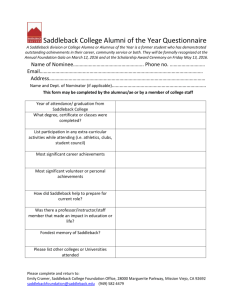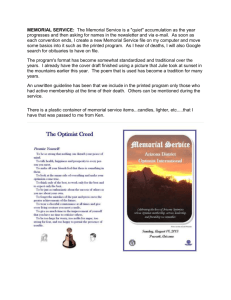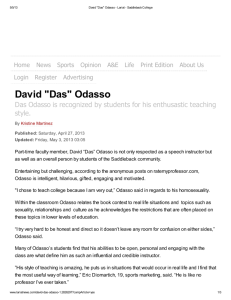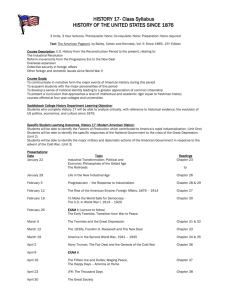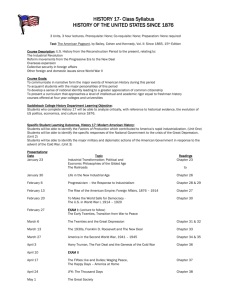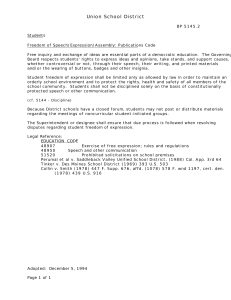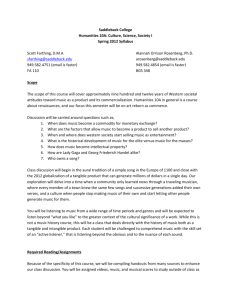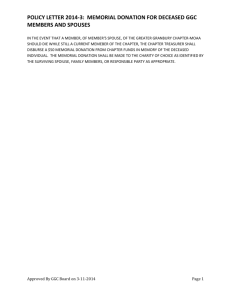The Pulse — Fall 2014 - MemorialCare Health System
advertisement
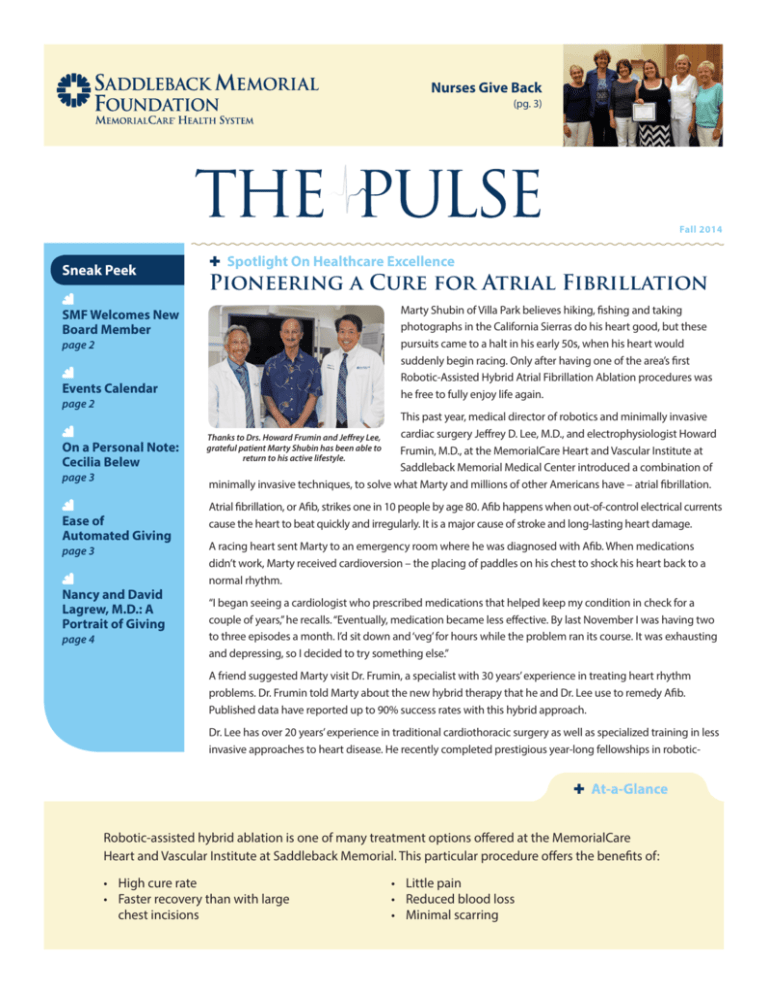
Nurses Give Back (pg. 3) Fall 2014 Sneak Peek + Spotlight On Healthcare Excellence Pioneering a Cure for Atrial Fibrillation Marty Shubin of Villa Park believes hiking, fishing and taking photographs in the California Sierras do his heart good, but these pursuits came to a halt in his early 50s, when his heart would suddenly begin racing. Only after having one of the area’s first Robotic-Assisted Hybrid Atrial Fibrillation Ablation procedures was he free to fully enjoy life again. SMF Welcomes New Board Member page 2 Events Calendar page 2 On a Personal Note: Cecilia Belew page 3 Ease of Automated Giving page 3 Nancy and David Lagrew, M.D.: A Portrait of Giving page 4 This past year, medical director of robotics and minimally invasive cardiac surgery Jeffrey D. Lee, M.D., and electrophysiologist Howard Thanks to Drs. Howard Frumin and Jeffrey Lee, grateful patient Marty Shubin has been able to Frumin, M.D., at the MemorialCare Heart and Vascular Institute at return to his active lifestyle. Saddleback Memorial Medical Center introduced a combination of minimally invasive techniques, to solve what Marty and millions of other Americans have – atrial fibrillation. Atrial fibrillation, or Afib, strikes one in 10 people by age 80. Afib happens when out-of-control electrical currents cause the heart to beat quickly and irregularly. It is a major cause of stroke and long-lasting heart damage. A racing heart sent Marty to an emergency room where he was diagnosed with Afib. When medications didn’t work, Marty received cardioversion – the placing of paddles on his chest to shock his heart back to a normal rhythm. “I began seeing a cardiologist who prescribed medications that helped keep my condition in check for a couple of years,” he recalls. “Eventually, medication became less effective. By last November I was having two to three episodes a month. I’d sit down and ‘veg’ for hours while the problem ran its course. It was exhausting and depressing, so I decided to try something else.” A friend suggested Marty visit Dr. Frumin, a specialist with 30 years’ experience in treating heart rhythm problems. Dr. Frumin told Marty about the new hybrid therapy that he and Dr. Lee use to remedy Afib. Published data have reported up to 90% success rates with this hybrid approach. Dr. Lee has over 20 years’ experience in traditional cardiothoracic surgery as well as specialized training in less invasive approaches to heart disease. He recently completed prestigious year-long fellowships in robotic- + At-a-Glance Robotic-assisted hybrid ablation is one of many treatment options offered at the MemorialCare Heart and Vascular Institute at Saddleback Memorial. This particular procedure offers the benefits of: • High cure rate • Faster recovery than with large chest incisions • Little pain • Reduced blood loss • Minimal scarring Pioneering a Cure for Atrial Fibrillation – Continued assisted coronary artery bypass surgery at the University of Maryland, and in robotic-assisted and minimally invasive heart valve surgery at the Cleveland Clinic. Ablation creates scars that block signals causing the heart to misfire. By using a robotic-assisted approach to surgery, Dr. Lee avoids major incisions. Instead, he makes tiny “keyhole” incisions for precision visualization and movement around sensitive heart structures. “About 30-60 days after I perform the minimally invasive cardiac ablation, Dr. Frumin threads a tiny catheter through a vein in the patient’s leg into the heart to survey the results from the inside and ‘spot weld’ any residual areas,” Dr. Lee explains. “This hybrid, or combined approach, brings together the best techniques of both worlds – that of cardiac surgery and cardiology. “A big difference between our combined approach and catheter ablation alone is we are able to close off the left atrial appendage, which should significantly reduce our patient’s risk of stroke.” The goals of this unique program are to prevent stroke, and to convert the patient’s heart back into normal rhythm – permanently. This procedure is not for everyone, but is one of the many options Saddleback Memorial now has to treat our patients with Afib. Dr. Frumin adds, “Traditional therapies for uncontrolled, chronic Afib aren’t always durable solutions. Historically with ablations, patients may return for a second, third or even fourth procedure, and there can be complications. I’m very enthused about the new hybrid procedure in carefully selected patients like Marty, as a safer and superior approach to the stand alone catheter ablation.” For both procedures, Marty stayed overnight in the hospital. “It was a lot easier than I ever imagined,” he recalls. “The nurses were phenomenally kind and caring. Even though I had major surgeries, neither procedure felt like one. I had surprisingly quick recoveries.” According to Dr. Lee, “Hybrid robotic-assisted cardiac ablations evolved from earlier therapies to benefit a growing number of Afib sufferers. It is one of the biggest advances in curing heart disease and preventing stroke of this decade, although most patients and physicians haven’t heard much about it yet.” Marty adds, “What a blessing to no longer have this hindrance holding me back. I didn’t have to chase down experts from another area of the country. Pioneers who could successfully treat my heart problem are right here.” + Events Calendar November Douglas/Bravo Golf Tournament Monday, November 3 Aliso Viejo Country Club •Support The Women’s Hospital at Saddleback Memorial at this 3rd annual golf tournament in memory of the Douglas and Bravo Families’ newborns. December Tree of Light Thursday, December 4 SMMC-Laguna Hills Conference Room 1 •Commemorate a loved one at this annual tree lighting event. February Heritage & Friends Luncheon Friday, February 6 El Niguel Country Club •A celebration of gratitude and giving in honor of Saddleback Memorial Foundation’s Heritage Society Members and Friends of the Foundation. For information about these events, call the Foundation at (949) 452-3724. Saddleback Memorial Foundation Welcomes New Board Member Saddleback Memorial Foundation is pleased to welcome Laurie Konsugar-Louie to the Board of Directors. Her understanding of the hospital system and strong emphasis on ethics will help the Foundation in its mission to develop philanthropic resources necessary in enhancing the health and well-being of the community. Laurie found her passion for the world of medicine at an early age and continued to pursue an education in the health field. She obtained a degree in Health Sciences Administration and worked as a hospital assistant department administrator at Kaiser Permanente San Diego. She also spent time overseeing the gift shop which raised money to help patient-centered programs at the hospital. Since moving to Orange County from San Diego to care for her late father-in-law, she has seen first-hand how Saddleback Memorial creates a healing and comfortable environment for both patients and their family. She hopes her past experience and presence on the board will help her to aid Saddleback Memorial in its continued effort of delivering quality and compassionate care. 2 On a Personal Note… Cecilia Belew, President Saddleback Memorial Foundation Gratitude is shown in so many ways. We say “thank you,” we offer to do things in return for good deeds bestowed upon us, and many like to “pay it forward.” At Saddleback Memorial, we are grateful for our patients who say thank you through charitable contributions to the Foundation. Each gift we receive on behalf of the hospital is very much appreciated. Jack and Diane Hecht made giving simple by setting up monthly automated payments directly from their bank account. They are able to support our hospital and the patients we serve in a convenient way that works for them. Dr. Lagrew and his wife Nancy have been supporting the medical center since 1988 through several ways including deferred charitable gift annuities. The hospital benefits while providing income and tax savings for the Lagrews – a win-win for all! Many companies and physicians groups prefer to support the medical center through event sponsorship, such as our Spring Gala and Corporate Golf Classic. Many Saddleback Memorial employees give through payroll deductions while retired staff give other ways like the nurses who give towards scholarships. Whether it’s a cash donation or including Saddleback Memorial in a bequest, every dollar counts and impacts the lives of many. For that, we are grateful. Ease of Automated Giving Automatic monthly donations have made Jack and Diane Hecht an integral part of the healing mission at Saddleback Memorial that they care so much about sustaining. Through an automatic recurring gift, funds are securely transferred from a bank or credit card account to the Foundation. And as Jack and Diane do, funds may be designated to a certain area of service at the hospital. “We’re able to give a small amount on a regular basis. Using a debit from my bank is secure and so much easier than writing a check every month,” says Jack, a retired manager of nationwide metal recycling companies and donor since 2010. Born in Germany, Jack fled with his parents to Shanghai, China during the Holocaust, before finding a way into the United States. His early years gave him a deep appreciation for suffering, and life. “It was Jack who first had the idea to share what we have – I really admire that about him,” says Diane, a native of Brooklyn, NY, mother, grandmother, retired schoolteacher, and Jack’s wife of 58 years. Two of Jack and Diane’s grandsons were born at Saddleback Memorial, before the couple moved to Laguna Woods in 2006. Since then, both octogenarians have been patients at the hospital. “The older we get, the less we take health for granted, because when you don’t have your health, nothing else really matters,” reflects Diane. “Our small sum adds up. Helping fund advances like Saddleback Memorial’s new beds and linear accelerator to fight cancer continues to give us a lot of personal satisfaction.” Nurses Give Back In 2013, four retired Saddleback Memorial registered nurses, Connie Beaman, Carleen Fellows, Carol Hadley and Marcie Smith, started the “Nurses 4 Nurses” scholarship award to help Saddleback Memorial nurses in their educational pursuits. This year registered nurse, Mary Ann Davidson also contributed to “Nurses 4 Nurses,” which will aid recipient Michelle Findlater in furthering her education. The Foundation is grateful for the nurses’ continued investment in their fellow colleagues as Saddleback Memorial employees strive to enhance their skills and ultimately provide quality care to our patients. In addition to Michelle, 32 other deserving Saddleback Memorial employees received scholarships to help them pursue their educational goals. This year more than $55,500 in scholarships were granted at the 37th annual Scholarship Awards. Funding for these scholarships was made possible through the generosity of Foundation board member Gary Damsker, Joyce and David Rabinov, M.D., Saddleback Kiwanis, Saddleback Memorial Foundation’s Endowment Fund and Jerry Werner. Since the scholarship fund was established in 1977, nearly $1 million in scholarships ranging from $100 to $5,000 have been awarded to over 550 valued employees at Saddleback Memorial. 3 + Planned Giving Nancy and David Lagrew, M.D.: A Portrait of Giving Advantages of a Deferred Charitable Gift Annuity David Lagrew, M.D. calls the Deferred Charitable Gift Annuity (DCGA) he made to Saddleback Memorial a “win-win-win” for his family’s financial security, his community’s hospital, and his own patients – women receiving care for high-risk pregnancies. Dr. Lagrew observes, “Walking around the campus I see the overall appearance of the hospital, the new MemorialCare Cancer Institute, The Women’s Hospital and key pieces of equipment within the nursery, on the obstetrical floor and in the OR, all here because of gifts like ours to Saddleback Memorial Foundation.” When Dr. Lagrew finished his residency and fellowship in the 1980s, he was scrambling to figure out how to get caught up on student loans. By the mid-90s he was making more and looked for ways that he and Nancy, a Saddleback Memorial operating room nurse, could put aside money for retirement. He chose a deferred charitable gift annuity that helped with their financial security, while supporting state-of-the-art care. A DCGA is a charitable planning tool where you gift cash or appreciated property to Saddleback Memorial in exchange for the promise to pay you (at a later date that you determine) a fixed income for the rest of your life. Based on the Lagrew’s ages at the Four benefits of a DCGA you won’t find in other retirement plans (like an IRA or 401k): •A beneficial tactic to use during your highest earning years due to the charitable tax deduction •Partial bypass of capital gains tax on appreciated stock •Partly tax free income •Charitable gift to an organization that you value time they set up the DCGA, they agreed to a certain rate and selected a future date to start receiving payments. They also received a tax break that same year. David and Nancy now have the security of knowing they will receive fixed income throughout their lifetimes with the remainder going to Saddleback Memorial Foundation to support the hospital they care about. “…it’s important to set aside funds for retirement sooner rather than later.” David and Nancy have two successful, grown sons. Dr. Lagrew has tried to impart to his sons that, “There will always be a lot of things competing for your money, so it’s important to set aside funds for retirement sooner rather than later.” He adds, “I know a lot more about medicine than financial planning, but I do know a deferred charitable gift annuity has many advantages for our family as well as for the patients of Saddleback Memorial.” Ways to Give + 4 The Pulse Did you know you can make a contribution in support of Saddleback Memorial Medical Center online? Simply visit www.memorialcare.org/smf and click on the “Give Now” button. The Pulse is published by Saddleback Memorial Foundation 24451 Health Center Drive Laguna Hills, CA 92653 (949) 452-3724 FAX (949) 452-3779 Saddleback Memorial Foundation raises philanthropic support for Saddleback Memorial Medical Center, a community-based, not-for-profit hospital with medical centers in Laguna Hills and San Clemente. www.memorialcare.org/smf Saddleback Memorial Foundation is a 501(c)(3) not-for-profit organization. Tax ID Number: 33-0011887. For more information or to remove your name from our mailing list, please call (949) 452-3724, or email smf@memorialcare.org.
